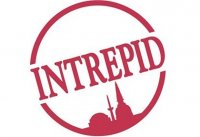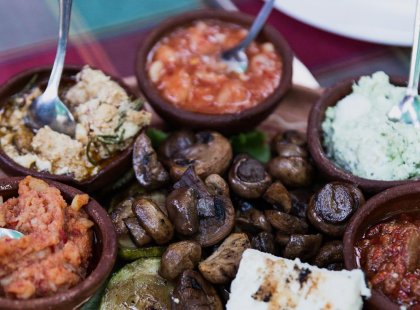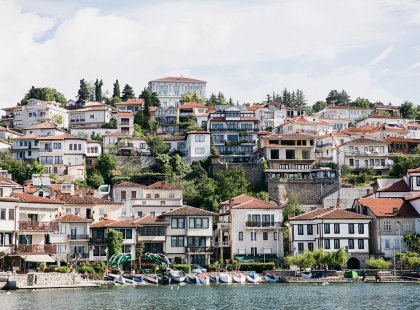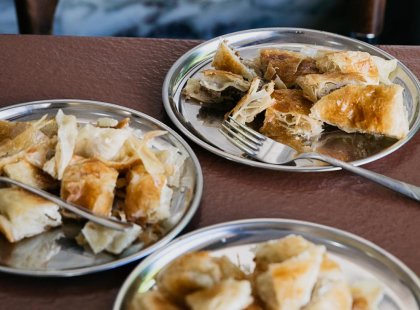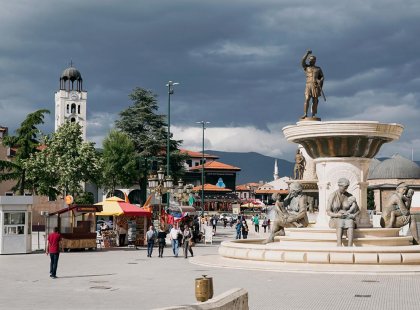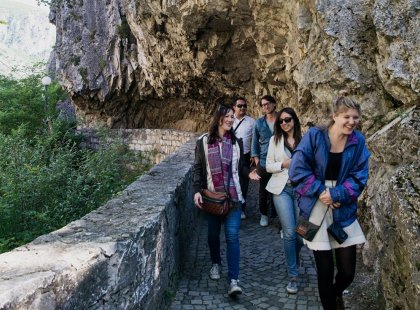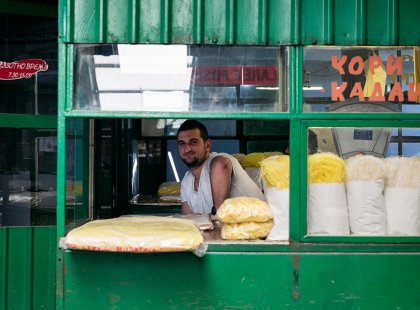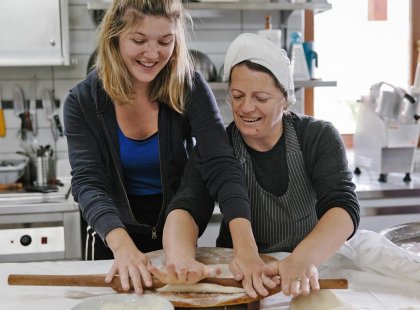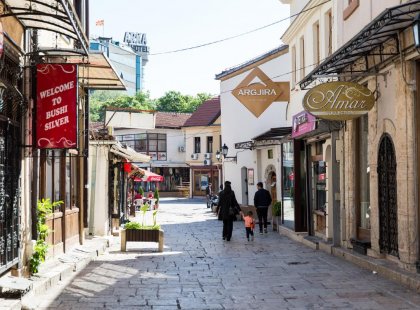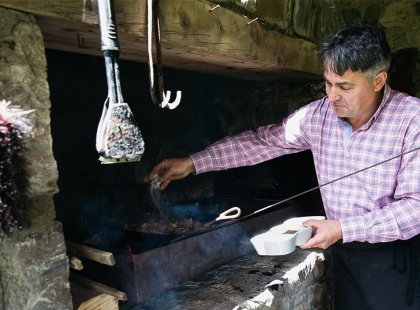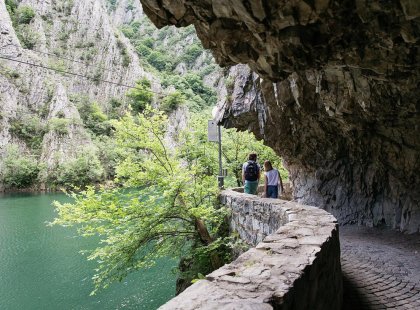Explore Croatia, Montenegro and Macedonia foodie hubs from Dubrovnik to Skopje. No one leaves this real food adventure hungry! Immerse yourself in the culinary delights of the Balkans on a twelve-day tour through Croatia, Montenegro and Macedonia. Picnic on the lush banks of the Treska River, stroll through national parks and soak up picturesque scenes of waterfalls, church-filled villages and some of Macedonia’s most spiritual sites. Sip a traditional fermented drink – boza – for breakfast (don’t knock it ‘til you try it!), master the art of the perfect pastry with the village women of Janche, enjoy A traditional barbeque in Kosovo, dine on a home-grown meal in the private garden of a Dihovo family and visit a centuries-old olive press outside of Kotor. Experience next level hospitality on this unforgettable foodie adventure.
-
Duration: 12 daysService level: Standard
-
Starts in: Hotel DubrovnikPhysical Grading: Light
-
Ends in: SkopjeAges: 15+
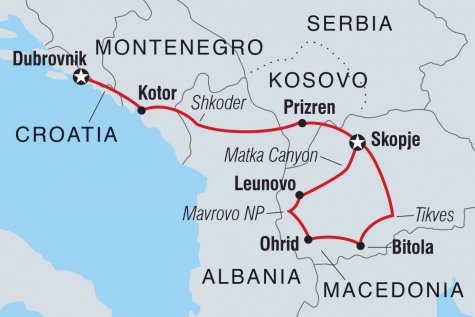
Itinerary
Start place: Hotel Dubrovnik
Your adventure begins with a welcome meeting at 6 pm today, check with reception to confirm the time and place. You can arrive at anytime before then. If you can't arrange a flight that will have you arrive at the hotel by early evening, you may wish to arrive a day early. We'll be happy to book additional accommodation for you (subject to availability). If you're going to be late, please inform the hotel reception. We'll be collecting your insurance details and next of kin information at this meeting, so please have these on hand. If you arrive early, perhaps head out to one of the Elafiti Islands. There's Lopud, a quiet island with lovely hikes, clean beaches and a ruined castle. Kolocep is a sleepy enclave that boasts walks for every fitness level, and Sipan is the most populated of the isles and reputedly has the most hospitable inhabitants.
After the meeting, head out with the group for an included dinner in the old city. Croatian cuisine varies from region to region, but a countrywide favourite that continues on the back of tradition is the charcuterie. Traditionally created with pork, charcuterie involves using a lot of specially prepared meats to create pates, rillettes, sausages, cured meats and more – all of which showcase flavours specific to their preservation process. If the option’s there, definitely give it a try.
The word konoba has shifted in meaning over the years, but typically when you see the sign outside of a building, you’ll know that it typically means the establishment is a costal restaurant offering regional dishes with fine wines and brandies. Today’s meal at the konoba includes several traditional home cooked dishes and drinks along with fruit liqueurs, olive oil and local wine. A main course of veal or lamb meat under the bell, garnished with potatoes, local bread and salads is your first dinner option; the second being the freshly grilled ‘catch of the day’ with olive oil and garlic for that authentic Croatian seafood flavour. Transfer to Kotor in the late afternoon hours, where the group stays for the night.
Continue on a short trip to an olive farm in the village of Tici, located in the Lustica bay area on the outskirts of Kotor. Discover traditional and contemporary techniques of producing this staple Mediterranean ingredient as the friendly hosts share their second-generation organic olive oil production techniques with the group. Wander through the beautiful olive groves before arriving at a well-preserved and ancient stone olive mill, where the olives were once milled by hand. A guided tasting allows an insight into what makes for good olive oil as you figure out various qualities using your tastebuds.
With free time later in the day, consider getting lost in the town’s crooked walkways, checking out the boutiques and cafes, or perhaps climb the hills behind the city to experience Kotor’s ruined fortification walls. A one-and-a-half hour hike up the stone steps, past churches, gates, and bastions to the Fortress of Sveti Ivan at the top rewards you with magnificent views across both the town and the brooding Bay of Kotor. Tomorrow begins your journey into Kosovo – consider savouring a last chance to taste Montenegro's flavours with an optional dinner of Montenegrin wine and traditional dishes at one of Kotor's fantastic wine bars.
By the time the early afternoon rolls in, you’ll arrive in Prizren, the second largest city in Kosovo. This picturesque location remains as the most culturally and ethnically diverse in all of Kosovo, playing home to Bosniaks, Serbians, the Gorani, Turks, Romani and Kosovo Albanians. The abundance of orange rooftops makes for a striking décor, as do the impressive mosques and churches in the city.
Begin with an optional lunch at the old bazaar, offering your first chance to enjoy the Kosovan cuisine. Bread, dairy (mainly yoghurt and white cheeses), meat and vegetables are all important staples of the average Kosovan diet, including pies or ‘trejte’, tave prizreni (the native Prizren casserole) and salads made with cucumber, dairy and garlic or onion. Stuffed peppers are also a big hit – keep an eye out for this tongue-tempting favourite. There’s plenty on offer at the bazaar as it teems with life, smells and sounds, yet the Kosovan gastronomic challenge lies in a strange delicacy – deep fried lamb brains. If in season, try it if you dare.
After visiting the bazaar, you are free to explore Prizren at your own pace. A guided sightseeing tour is on the cards, or you can choose to wander through the streets on your own as the evening closes in, enjoying the young and sociable nightlife.
Considered to be a division of Balkan cuisine, Macedonian dishes reflect influences taken from both Mediterranean and Middle Eastern cultures. The relatively warm climate in the country allows for excellent growing conditions for juicy vegetables and fruits, along with fragrant herbs which are often added to dishes. Macedonian dairy products, wines and local alcoholic beverages, such as rakija, have gained considerable respect for the variety and quality of flavours they offer. However if there’s two things you should keep an eye out for in Macedonia, it’s tavce gravce, a traditional dish prepared with fresh beans, pepper and onion, along with mastika, a liqueur seasoned with resin gathered from the mastic tree which is served best with a tarator salad.
Take a stop at the nearby St. Jovan Bigorski Monastery (St. John the Baptist), which is widely renowned as the most spiritual monastery in Macedonia. This 19th-century structure, erected upon both the ruins of an 11th-century church and the slopes of Mt. Bistra, plays home to a small silver coffin allegedly containing the remains of St. John himself.
Continue on to the village of Janche, sitting in the winding canyon that guides the Radika River. The village is known as one of the oldest in the region – its quaint houses line the hillside in harmony with the natural surrounds. After a quick walk around this unique village, a hands on cooking class with the local women will teach the skills required to make local pastries, considered to be a specialty of this region. After lunch, drive onward to Ohrid where you will arrive in the evening.
Driving time today is approximately 4 hours.
Today is free to explore the town’s streets and churches, maybe picking up a bargain or two in the vibrant Old Bazaar. You might want to ask your leader for good local restaurants in the area as you make breakfast and lunch ideas. A highly recommended favourite is fish stew, a traditional dish that often comes served in a light, lemony broth. Alternatively, consider joining your leader for an optional day trip to the southern point of Ohrid Lake and the mystical Sveti Naum Monastery, one of the most important places of pilgrimage in Macedonia. Take in the ancient Tast Samoil’s Fortress, which stands on the top of Ohrid Hill and looks across the town, along with a 2000-year-old Roman theatre that was uncovered near its upper gate. The Sveti Jovana Kaneo church, which picturesquely sits on a town-top rocky outcrop overlooking the lake, is one of the most popular in Macedonia and definitely worth the visit.
This evening, head to Kuratica, a village on the outskirts of Ohrid. Here you’ll experience true local hospitality and enjoy a home-cooked meal of regional delicacies. Your host also brews his own rakija, infused with herbs only found in this region, which you’ll be lucky enough to taste.
Notes: If it has rained on the day you visit, or the day before, you may go foraging for edible snails in Kuratica and use the collection for dinner.
Drive onward to Dihovo, another little village sitting quietly in the foothills of Mt Pelister. A local beekeeper will teach you about the fascinating world of the honeybee as they share with you their secrets – you’ll get a hands on approach to beekeeping and honey as you don on protective gear for an optional open beehive demonstration. Afterwards, enjoy a tasting of honey extracted straight from the comb before tucking into a home-cooked meal in a stone and wood villa built in traditional Macedonian style. All of the ingredients are organic and come from the family’s own private gardens.
Arrive in Bitola by mid afternoon. Relax in one of the city’s many cafes, explore the stalls of the Old Bazaar or choose to take a guided tour of the ancient town and archaeological site of Heraclea Lyncestis, located on the outskirts of Bitola. Heraclea was founded by Philip II of Macedonia in the fourth century BC after he had conquered the surrounding region of Lyncestis and incorporated it into his kingdom of Macedon. The city was named in honour of the mythological hero Heracles, whom Philip considered his ancestor. With its strategic location, it became a prosperous city. Each object, each stone, each pedestal is shrouded in mystery.
Later in the morning, head out to the Stobi archaeological site for a short sightseeing walk. Stobi, once known as Paeonia, was conquered by the ancient kingdom of Macedon and turned into the capital of the Roman province of Macedonia Salutaris. It is considered by many to be the most famous archaeological site in Macedonia – the intricately carved basilica, well preserved stone columns and structures along with the ancient theatre area are all spectacular memoirs of a time of antiquity.
Continue on to the wine region of Tikves, where you’ll meet an international wine writer, critic and author responsible for writing the very first guide to Macedonian wine. The production of wine and wine grapes has traditionally been fairly prominent in Macedonia, thanks to an abundance of sunshine and rich, rocky soil. This has been the case since Roman times, where wine production was typically conducted in monasteries. Tikves continues to play an important role in the country’s wine production since the 4th century BC and is home to many of the country’s finest wineries – today’s adventures offer a taste of local varieties at two of these acclaimed wine estates. Enjoy a pairing of delicious local cheeses next to these wines in an afternoon of laughter and indulgence.
After immersing yourself in the full flavours of Macedonia’s wine culture, arrive in Skopje in the late afternoon. Tonight is free to explore Macedonia’s capital at your own pace – perhaps consider asking your leader for restaurant suggestions.
Travel to Matka Canyon, a fascinating gorge containing a rich complex of medieval buildings, churches, monasteries and the remnants of a fortress. After a short walk to the Monastery of St Andrew, a boat will collect you for a relaxing sail through Matka Canyon and down the Treska River with a picnic lunch stop along the way.
Once lunch is finished, return by boat and depart in the van to Skopje. This evening, the group leader will offer suggestions for a final group dinner – the perfect way for say farewell to Macedonia.
End place: Skopje
Inclusions
Included
- Ston - Town Visit
- Putnokovici - Local Farm Visit
- Njegusi - Smokehouse Visit & Tasting
- Lustica - Olive oil farm visit
- Prizren - Walking Tour
- Albania - Rozafa Fortress
- Shkoder - Rozafa Fortress visit
- Kosovo - Sightseeing Tour
- Pristina - Gracanica Monastery Visit
- Gracanica - Traditional Lunch
- Leunovo - Painted Mosque of Tetovo Visit
- Leunovo - Traditional Home Cooked Dinner
- Janche - Cooking Class
- Mavrovo National Park Visit
- St Jovan Bigorski Monastery Visit
- Kuratica - Local Home Cooked Dinner
- Dihovo - Beekeeping Masterclass
- Ohrid - Green Market Visit/Breakfast
- Dihovo - Villa Dihovo Lunch
- Tikves - Wine Tasting
- Bitola - Stobi Archaeological Site Visit
- Matka - Matka Canyon Boat Cruise
- Skopje - Green Market/Picnic
-
Transport
Private Vehicle -
Accommodation
Hotel (8 nights), Homestay (3 Nights)
